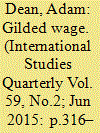| Srl | Item |
| 1 |
ID:
139532


|
|
|
|
|
| Summary/Abstract |
Scholars of international political economy often argue that workers automatically share the same trade policy preferences as their employers. However, this approach assumes that trade policies that increase profits necessarily lead to increases in wages. In contrast, I argue that capital and labor are more likely to share the same trade policy preference when “profit-sharing institutions” permit capital to credibly commit that an increase in profits will lead to an increase in wages. In support of my argument, I present a structured, focused comparison of the American textile and steel workers' unions during the late nineteenth century. Both unions supported the high tariffs that protected their industries when credible profit-sharing institutions were in place, but did not support high tariffs when such institutions were absent.
|
|
|
|
|
|
|
|
|
|
|
|
|
|
|
|
| 2 |
ID:
163281


|
|
|
|
|
| Summary/Abstract |
I argue that international trade increases military enlistment in the United States. Trade-related job losses reduce economic opportunities in local labor markets, and the government responds by increasing military recruitment efforts in those counties. This dynamic challenges conventional accounts of globalization, which tend to overlook the local impact of free trade and only examine the traditional welfare policies that governments offer to compensate “trade losers.” This study analyzes an original, county-level data set on army enlistment and trade-related job losses from 1996 to 2010. The results suggest that a trade shock of one thousand job losses is associated with a 33 percent increase in army enlistment in the median county. To illustrate the causal mechanisms that link free trade to army enlistment, this study also presents a case study based on original interviews in Catawba County, North Carolina, a county particularly impacted by trade liberalization.
|
|
|
|
|
|
|
|
|
|
|
|
|
|
|
|